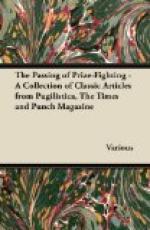This is what was said:—
MR. SADROCK (mixing himself an egg nogg). Will you join me?
MYSELF. No, thank you. But I like to see you applying yourself to Subsidiary Studies to the Art of Butler.
MR. SADROCK (roaring with laughter). That’s very good. Some day you must put your best things into a book.
MYSELF. You bet.
MR. SADROCK. I wonder why it is that you make me so frank. It is your wonderful sympathetic understanding, I suppose. I long to tell you something now.
MYSELF (affecting not to care). Do. I am secrecy itself.
MR. SADROCK. Would it surprise you to know that I am privily a Dissenter? Do you know that I often steal away in a false beard to attend the services of Hard-Shell Baptists and Plymouth Brethren?
MYSELF. I hope I am no longer capable of feeling anything so demode as surprise.
MR. SADROCK. And that I prefer Robert Elsmere to the Iliad?
MYSELF. May I print those declarations in my book?
MR. SADROCK. Some day, yes, but not yet, not yet.
* * * * *
MR. SADROCK AND NONCONFORMITY. To the Editor of “The Monday Times.”
SIR,—I find it necessary, in the interests of truth and of respect for the memory of my uncle, Mr. Sadrock, to contest the accuracy of the Margotist’s report of conversations with him in 1902. To begin with, my uncle died in 1898, four years before the alleged interview. She could therefore not have talked with him in 1902; and the locale of this meeting, the Prime Minister’s room, becomes peculiarly fantastic. Secondly, no member of his family—and they saw him constantly—ever heard him utter anything resembling the sentiments which the Margotist attributes to him. Mr. Sadrock was both an undeviating Churchman and a devotee of HOMER to the end of his life.
I am, etc., THEOPHILUS SADROCK.
THE MARGOTIST’S REPLY.
SIR,—I have read Mr. Theophilus Sadrock’s letter and am surprised by its tone. If Mr. Sadrock did not make use of the words that I attribute to him how could I have set them down? Because I was writing unobserved all the time he was talking, and I could produce the notes if they were, to others, legible enough for it to be worth while; surreptitious writing must necessarily be indistinct at times. As for the question of time and place, that is a mere quibble. Mr. Sadrock was alive when we had our talk, and I am sorry if I have misdated it. The talk remains. May I add that it is very astonishing to me to find people with the effrontery to suggest that they knew their illustrious relatives better than strangers could. Everyone is aware that the last place to go to for evidence as to a man is to his kith and kin. When my book appears there will be a few corrections; but in the main I stand by the motto which I invented for Chamberlain one evening: “What I have written I have written.”




